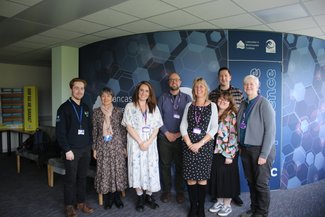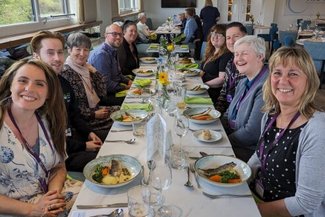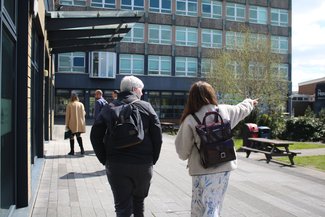In May 2024, Edge visited Morecambe Bay, where a collective of local educators are designing a new curriculum inspired by the upcoming Eden Project Morecambe. Construction is yet to begin on the new location of this world-famous environmental project, best known for its iconic Biomes in Cornwall. However, the local education community soon spotted parallels between Eden Project’s ethos of regeneration and sustainability and Morecambe Bay’s rich biodiversity and net zero goals.

With support from Lancaster University, Lancaster and Morecambe College, University of Cumbria and the Eden Project, among others, and inspired by Eden Project’s groundbreaking educational partnerships – which Edge has supported – local teachers have been embedding sustainability, place and environment into day-to-day teaching. As part of a collection of projects sharing the same ethos, they have also been working alongside academics to co-design the pioneering Morecambe Bay Curriculum (MBC).
An ambitious educator-driven initiative, the MBC aims to transform primary, secondary, higher and further education across the region. By embedding environmentally aware, place-based, and interdisciplinary projects into the curriculum, the aim is to connect learners to the beauty and biodiversity of the local environment. Edge visited two early adopters of the curriculum to see the project in practice.
Embedding sustainability across further education
Our visit began at Lancaster and Morecambe College (LMC), where the college’s catering students laid on a fantastic lunch for us. This was more than your average welcome meal – it incorporated produce grown on-site, showcasing LMC’s efforts to establish a net-zero working kitchen and underlining its commitment to sustainability in all areas of college life.
After lunch, LMC’s Sustainability Lead, Maggie Cawthorn, led us on a guided tour to show us how the college is weaving the MBC into various vocational programmes, from hairdressing to construction. We also met Sam Taylor, a construction tutor at the college who has been collaborating on sustainable practices with academic researchers from Lancaster University’s Architecture Department. Co-design between teachers and academics – combining pedagogical expertise with cutting-edge research – is core to the MBC. We also met students learning about sustainable techniques such as how to install ground source heat pumps – demonstrating the college’s readiness to support learners in the all-but-inevitable transition away from fossil fuels.

Fostering environmental stewardship from an early age
Our visit continued at Ryelands Primary and Nursery School, where we met Linda Pye, headteacher and Chair of the MBC Early Years, Primary and Special Schools Working Group (one of five working groups on the project, each covering a different stage of education). Linda showcased the school’s efforts to embed outdoor learning into the curriculum. For instance, we saw children who had once struggled with ‘plant blindness’ now identifying various flora and fauna on the school grounds, thanks to the MBC building environmental awareness.
Another way the curriculum is being applied in Early Years is via the so-called ‘Eden Bear', which classes use as a resource to support local storytelling. Children are encouraged to take photos of themselves with the bear in locations that are important to them. These are then published in a book, allowing local communities to see which places young people value. The project has proven effective in facilitating dialogue on place- and nature-based issues, supporting early language acquisition, and giving children a sense of the environmental diversity of the area. This is just one of many approaches taken by teachers to apply the MBC.
A long-term, teacher-driven movement
Carys Nelkon, Morecambe Bay Curriculum’s Partnership Development Manager, explained that the MBC project is a teacher-driven movement, ultimately powered by educators who want to integrate a sense of place and sustainability into young people’s lives. Her role is to support the different MBC working groups – spanning early years, primary, secondary, further, and higher education – to develop projects that are tailored to their respective contexts, ensuring an integrated approach and access to support for educators as needed.

As already touched on, the MBC also addresses a crucial issue identified by teachers – a need for more environmental knowledge and the necessary confidence to incorporate this into classroom teaching. By bringing together educators and academics in a codesign model, the MBC provides expert multidisciplinary knowledge and cutting-edge environmental research to support teachers in delivering engaging and relevant learning.
One unknown, of course, is how the environment will change in the face of the climate crisis and other environmental pressures, and the subsequent impact this will have both on what is taught and how. This is one reason why participants see the Morecambe Bay Curriculum as a long-term, intergenerational project, with teachers committed to at least a 25-year implementation timeframe.
As Eden Project Morecambe prepares to begin constructing new pavilions in the Bay, the MBC shows fantastic initiative on behalf of the local education community. Teachers in the area hope, eventually, to integrate the MBC with Eden Project Morecambe, with potential new partnerships emerging between the two, mirroring existing education partnerships at the Eden Project in Cornwall.
For Edge’s part, the Morecambe Bay Curriculum presents a brilliant example of how an inclusive, well-structured, and community-driven programme of learning can transform education for people of all ages. While still in its early stages, the MBC is a solid proof of concept, demonstrating the feasibility of regional sustainability-focused curriculums. It also highlights the power of coordinated grassroots efforts. Allowing teachers and academics to support one another promises to shape a generation of environmentally conscious, proactive citizens who are equipped to address the challenges of our time. We are eager to see how the project progresses!
